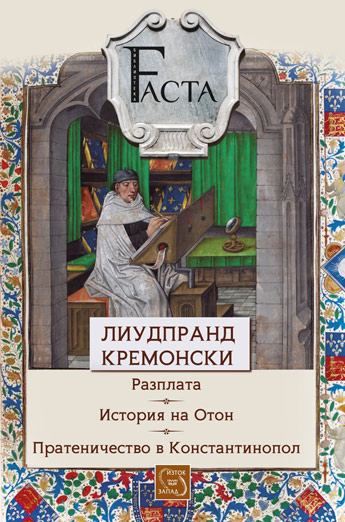Разплата. История на Отон. Пратеничество в Константинопол. Разплата. История на Отон. Пратеничество в Константинопол
The Complete Works of Liudprand of Cremona. Тhe Antapodosis. Historia Ottonison. The Embassy to Constantinople
Author(s): Liudprand Liudprand of Cremona
Contributor(s): Liliana Simeonova (Translator), Liliana Simeonova (Composer)
Subject(s): Politics / Political Sciences, Christian Theology and Religion, Politics, History, Anthropology, Philosophy, Cultural history, History of Church(es), Geography, Regional studies, Human Geography, Regional Geography, Historical Geography, Applied Geography, Maps / Cartography, Theoretical Linguistics, Studies of Literature, History of Philosophy, Epistemology, Semiology, Ethics / Practical Philosophy, Political Philosophy, Social Philosophy, Special Branches of Philosophy, Political Theory, Political Sciences, Sociology, Comparative history, Diplomatic history, Ethnohistory, Political history, Social history, Middle Ages, Theology and Religion, Comparative Studies of Religion, Religion and science , Historical Linguistics, Other Language Literature, Philosophy of Middle Ages, Philosophy of Religion, Philosophy of Law, International relations/trade, Politics and religion, Politics and society, History and theory of political science, Cultural Anthropology / Ethnology, Culture and social structure , History and theory of sociology, Policy, planning, forecast and speculation, Sociology of Culture, 6th to 12th Centuries, Eastern Orthodoxy, Sociology of Politics, History of Religion, Philosophy of History, Politics of History/Memory, Rhetoric
Published by: Издателство »Изток-Запад«
Keywords: Liudprand of Cremona; Middle Ages; Мedieval European culture; religion; Constantinople; Italian; German; history; Byzantium; iron century; Otto the Great; diplomacy; diplomatic process; Roman Empire; Saxony; book;books;
Summary/Abstract: This modern translation of all the surviving literary compositions ascribed to Liudprand, the bishop of Cremona from 962 to 972, offers unrivaled insight into society and culture in western Europe during the "iron century". Since Liudprand enjoyed the favor of the Saxon Roman emperor Otto the Great, and traveled to Constantinople more than once on official business, his narratives also reveal European attitudes toward the Byzantine Empire and the culture of its refined capital city. No other tenth-century writer had such privileged access to the high spheres of power, or such acerbic wit and willingness to articulate critiques of the doings of powerful people. Liudprand's historical texts (the Antapodosis on European events in the first half of the 900s, and his Historia Ottonison the rise to power of Otto the Great) provide a unique view of the recent past against a genuinely European backdrop, unusual in a time of localized cultural horizons. Liudprand's famous satirical description of his misadventures as Ottonian legate at the Byzantine court in 968 is a vital source of information on Byzantine ritual and diplomatic process, as well as a classic of medieval intercultural encounter. Readers interested in medieval European culture, the history of diplomacy, Italian and German medieval history, and the history of Byzantium will find this collection of translated texts rewarding. A full introduction and extensive notes help readers to place Liudprand's writings in context.
Series: Философия, хуманитаристика, история – Издателство Изток-Запад
- Page Count: 336
- Publication Year: 2015
- Language: Bulgarian
- eBook-PDF
- Sample-PDF
- Table of Content
- Introduction

